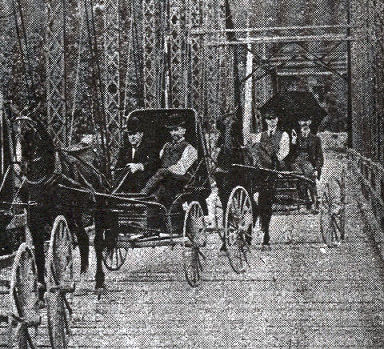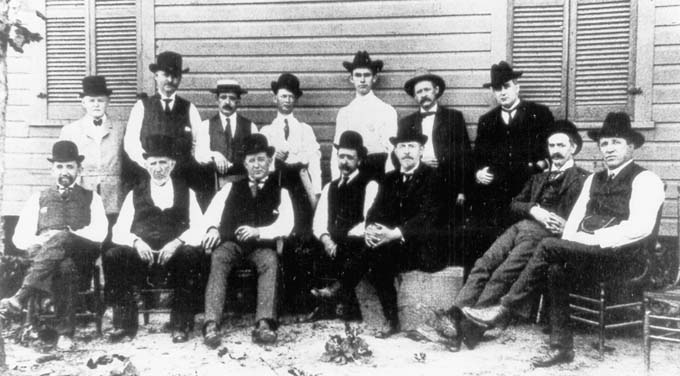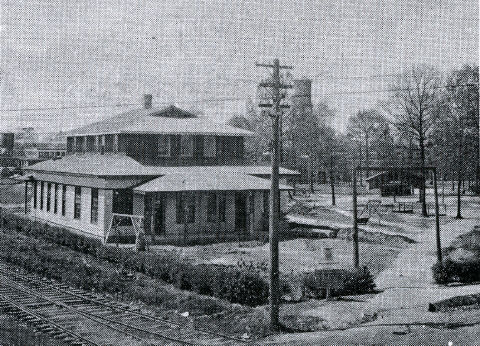Erwin Mill
I visited with Joe Johnson a couple of blocks from the abandoned textile mill that was the town of Erwin's lifeblood. For nearly a century, Erwin Mills made denim cloth, and the town proudly called itself "the denim capital of the world." Joe worked in the mill from 1943 until his retirement in 1986.
The closing of Erwin Mills last year signaled the passing of an age, and not just in Erwin and Harnett County. Textiles remains the state's largest manufacturing industry, but textile employment has declined by almost half in the last 30 years. Boarded-up textile mills and empty cotton warehouses are an enduring part of our landscape now.
Joe and I talked at a wonderful museum that he and other Erwin Mills veterans have launched next to the public library downtown. The museum highlights Erwin's mill village heritage. And this past year, despite the mill's closing, Erwin still celebrated "Denim Days," its largest festival. Joe says the Chamber of Commerce hasn't decided yet whether to rename the festival in the future, but no matter what, you're all welcome.

Mr. F.L. Fuller and Mr. B.N. Duke (first carriage) and Mr.
W.A. Erwin and Mr. J.S. Cobb (second carriage) visit Erwin Mill No.
2.
My father was raised here on the Cape Fear River, and that was long before they even imagined the mill starting here. When the Dukes and the Erwins and all those folks decided that they wanted the property, my family literally sold them the farm. My family -- the Johnsons and the Averys and the Snipes -- sold the land to the folks that wanted to build the mill, helped build the mill, and then went to work in the mill and stayed there till they died.
My father, my uncles and aunts, you name it, they were all there. They did everything from spinning the cotton to making the cloth. One of the first houses that was built was a boardinghouse for the mill officials, and my grandmother ran it. They ran a drop cord from the mill to Granny's, and that was the first house that had electricity.
My mother, her family lived up beyond Lillington and came down to Erwin, got a house and got jobs in the mill. Lots of times, you'd have folks who, back in the early days, worked on the farm all their life. That farming life was tough. They'd have a family in town that they knew, and they'd come in and live with them because the person in town here had a steady job, where the guy on the farm did not. He was a sharecropper.
Cotton was hand-picked in the fall of the year. Then the farmer would take it to the gin and you'd see a line of trucks and mules and wagons here to the mill. Cotton was weighed and sold right here, and they'd end up weaving it and selling it. We made more denim cloth than any place in the world. At one time, our capacity was a million linear yards, or more, a week, and that's a fact. We could lay it on you.
The Erwin plant always made primarily denim. When I was a child, denim meant overalls, pure old bib overalls, like the old country boy out planting his farm with his mule would wear. And coveralls, say, for a mechanic. Later, we got into making some lightweight denim too, like that shirt you're wearing. We were proud of our product.
During the Depression, this plant never stopped. It never stopped. It ran. There are some shrewd people that have operated Erwin Mills. The Duke family and their friends were all millionaires, and they came down here to the east bank of the Cape Fear River and bought land.

Barbecue in Erwin, NC (Mill No. 2): Fourteen men with prominent positions in the Durham community: (front, left-right) BN Duke, Washington Duke, JB Duke, TJ Walker, AB Carrington, JS Cobb, John Angier; (back) Dr. AG Carr, WA Erwin, JE Stagg, Frank Tate (in charge of building Erwin Mill No. 2), ES Yarbrough, Capt. Lemon (in charge of building Durham & Southern railroad) and FL Fuller (photo taken in 1904).
They bought land in the 1890s and the mill was up and running by 1903. They built a big mill and a power plant and a brick mill. They built the churches, a hospital, houses for folks. They owned the railroad, too. We had our own icehouse, our own cotton gin, blacksmith shop. And in town, everybody had a garden. I mean a big garden. Out on the edge of town, the mill owned all the land and if you wanted a bigger garden, you could have your bigger place down just 4 or 5 blocks away. A lot of folks would raise hogs and the hog pens were all on the edge of town too.
Folks came from all over the country trying to get into the little town of Duke. That's what Erwin was called at that time. Then, in 1925, the Dukes and the Erwins built an entire new mill, doubled the number of houses, and brought in the doctors and merchants that you need. There were families that were working in Erwin Mills in Durham, and the entire families moved down here. There was a big population of Durham folks here.
They didn't just work in the mill. The mill provided us with a swimming pool, tennis courts, a bowling alley, even started a theater. We had a semipro ball team. We had a town band. We had a zoo, and we had a big park. After the guys worked in the mill, they would come home, get all dolled up, then they'd sit out in the park. Maybe you'd bring your girlfriend. Back when I was a child, we'd go out there and sit on the park bench and there would be silent movies.

Entrance to Erwin Park (Erwin, NC)
I'll never forget that mill whistle either. You had your "wake whistle." That was an hour or more before you started work, then when the "work whistle" sounded everything started humming. Most of the time, folks got used to it and never even heard it. It was just part of the scenery.
All that went its way after the Second World War. That was a whole new world of change then. In the late '40s and early '50s, the houses were sold to the employees, and they started selling off the different farmlands and whatnot. Most of the folks bought the houses. I bought mine.
The mill finally closed because they could make more money operating in Mexico than in Erwin, North Carolina. Bottom line. At the peak time, the mill probably employed around 2,400 folks. But later on, in the late '70s, when the new machinery began to come in, it dwindled down to about 1,400 in about a 10-year period. Attrition took care of most of them.
But when they closed the mill down for good, you're talking about 1,400 people losing their job in a two-year period. The first folks were the young bunch, the recent hires and some with maybe 10, 12 years seniority. But the last bunch, there was a group that was within 2 to 5 years of retirement. That's the ones that took a licking. They were offered to go back to school and learn this new trade, but when you got a 55- or 60-year old guy, he's not too interested in going back to a computer lab or something.
I'd be the same way. I never saw a computer till I was about 45. My son works at BTI, my daughter-in-law works for IBM, and I go in their computer room at home and I see all that stuff, and I say, "Hey, that's nice. That's great. Let's go to Home Depot!"
Above article is by David Cecelski (visiting professor at Duke University's Center for Documentary Studies) and was published in the 12/9/01 News & Observer.
Erwin Mills History Room
For a memorable day trip, motor down Route 55 and discover the Erwin History Room at 100 West F Street (next to Erwin Town Hall). If you like old mill villages, this trip comes highly recommended. What a wonderful collection of Erwin Mills artifacts and old photos -- including several items from the mills in Old West Durham.
The electric hair weave machine is a must-see. You'll also enjoy old photos and B&W footage of Erwin Mills, Erwin Park, Erwin swimming pool, and Erwin School.
Afterwards, grab something to drink at Shirley's Diner (in the business district next to the mills). This two-story, red-brick building on the corner was the original company store. Then drive around Erwin Mills No. 2 and the surrounding mill village. It'll all look very, very familiar!
The Erwin History Room is open to the public on Sunday and Wednesday (2:00-4:00 pm). Free admission. While you're there, say hello to museum docents, Joe Johnson and Vic Fowler. Both worked many years at the mills in Erwin and both have kin in Durham (Joe's relatives lived in the mill village near Erwin Road and Vic has kin on Gin and on Carolina).
Directions from Old West Durham: Follow Route 55/East to Erwin. In a hurry, take I-40/East to I-95/South to Dunn (exit 73). Take Route 421/North to Erwin. The mills, town hall, and Erwin Mills History Room are west of the highway. On your way down or back, stop for a real meal at "Ma's Kitchen" -- on Route 55 in Coats, NC.

Erwin History Museum: Former mill worker, Joe Johnson, walks past Erwin history.

